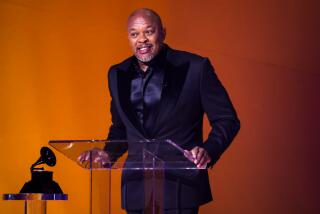A New Kind of Struggle for King
- Share via
ATLANTA — Coretta Scott King -- widow of slain civil rights leader Martin Luther King Jr. -- managed to say a few words on Friday and “clearly wants to communicate,” but her physician said she might not fully recover from a stroke.
King, 78, suffered the stroke Tuesday morning when a blood clot became lodged in the part of her brain that controls speech, said Dr. Margaret Mermin. She has not been able to walk or speak since then.
“Emotionally, she’s doing as well as she can be expected. She gets frustrated at times,” said Mermin, King’s personal physician for 10 years. “She can point to pictures and words when she wants to communicate ... and her spirits are actually very good.”
Camera crews, anxious for information, have been posted outside Piedmont Hospital since King was hospitalized.
Often a gracious presence at Atlanta functions, King this summer followed her doctor’s advice to cut back on public appearances.
In January, she was diagnosed with atrial fibrillation, which causes an irregular heartbeat and can increase the chance of stroke. Since then, she’s had two “warnings of strokes,” Mermin said, including one episode that caused her to lose speech for two hours.
On Tuesday morning, while she was sitting with her daughter Yolanda King, she suffered a major stroke and a small heart attack caused by a second clot that lodged in her heart.
“There was a good deal of anxiety” over King’s condition early in the week, said the Rev. Joseph Lowery, an elder statesmen of the civil rights movement who remains close to the family. Over the next several days, King showed that she can count, say a few words, sing familiar songs and point to picture boards supplied by a physical therapist.
Yolanda King said Thursday that she and her siblings were “completely assured that she will come to a complete recovery,” Associated Press reported.
Coretta Scott, a classically trained singer, was drawn into activism when she married a young Atlanta divinity student in 1955.
“As we were thrust into the cause, it was my cause too. I married the man and the cause,” she said in January, the Atlanta Journal-Constitution reported. “I realized I, too, could be killed.”
After her husband was assassinated in 1968, she founded the King Center for Nonviolent Social Change, which was first housed in her basement. It expanded into a downtown complex that draws 650,000 visitors annually, according to the center. Each January, around the anniversary of her late husband’s birthday, King typically gives dozens of interviews and travels for speaking engagements all over the world.
Without her activism, “we would not know Martin even existed, in a sense,” said the Rev. Barbara King, an Atlanta minister who is a family friend. Julian Bond, chairman of the board of the National Assn. for the Advancement of Colored People, said Coretta King had safeguarded a central tenet of her husband’s philosophy.
“This belief of his that human conflict can be settled peaceably has slipped down the list of attributes,” Bond said. “She is the single person who kept this notion going.”
Earlier this year, following several burglaries, King moved from the home she shared with her late husband into a condominium in Buckhead, a tony neighborhood of Atlanta.
More to Read
Sign up for Essential California
The most important California stories and recommendations in your inbox every morning.
You may occasionally receive promotional content from the Los Angeles Times.














